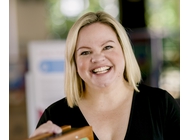Topping out of Bio-Innovation Centre
- Date 24 Jul 2018
Cambridge’s innovation ecosystem has received another boost with the topping out on 19 July of the Bio-Innovation Centre at Cambridge Science Park – part of a new cycle of investment and renewal catalysed by a landmark joint venture between Trinity College and Tus-Holdings, Beijing.
In February this year, Trinity agreed a £200 million collaboration with Tus-Holdings, the parent company of Tus Park – the science park development body of Tsinghua University – to create the Bio-Innovation Centre, a neighbouring research and development facility, and three other buildings at Cambridge Science Park.
At the topping out ceremony, the Master of Trinity, Sir Gregory Winter, paid tribute to the commitment and enthusiasm of Tus Park colleagues in their engagement with the Cambridge tech community, as well with Trinity College and Cambridge Science Park.
"It is also evident that Tus shares our mission – to help innovative companies to grow successful businesses, create jobs, and help support economic development resulting in greater prosperity for all – particularly companies in the fields of healthcare, deep technology and environmental technology – companies that are passionate about finding innovative solutions to the world’s unmet needs"
More than 100 guests attended the event with remarks by Sir Gregory, the Senior Bursar, Rory Landman, Tus Park UK President, Kevin Lin, Tus-Holdings Chairman, Jiwu Wang, Tus Science and Technology Service Company President, Ming Yang, Minister from the Chinese Embassy, Hui Ma, David Sheppard, of the Department of International Trade Life Science Organisation, and Cambridgeshire’s High Sheriff, Andy Harter, and Lord-Lieutenant, Julie Spence.
Cambridge Science Park Director, Jeanette Walker, chaired the event and was interviewed on BBC Look East’s 10.30pm news (available until 10.45pm, 20 July) about the significance of the joint venture.
She said: ‘The reason we partnered with Tuspark is because of their collaborative outlook. There is lot of synergy between them and the University of Cambridge, they develop science parks and incubators, and they also want to invest in companies here in Cambridge, indeed they have already invested in two biotech companies.’
The Trinity–Tus Park collaboration is important because it offers entrepreneurs and businesses at Cambridge Science Park the opportunity to understand the Chinese market. In the life sciences alone, UK exports to China were worth £1.3 billion last year.
Ming Yang, President of Tus Science and Technology Service Company, said there was a natural synergy between Tsinghua and Cambridge Universities. ‘We share a common goal which is to help small start-ups to grow.’
Sir Gregory reflected on his own journey – from a former stable which smelt of goat – to the development of antibody-based drugs to treat cancer and auto-immune conditions that have transformed the pharmaceutical industry. He said:
"How much faster and efficiently we would have grown had we been immersed in a culture such as we are aiming to develop on the Science Park with Tus. Opportunities to meet a wide range of investors, learn from more experienced companies, to grow within the same Science Park, move into laboratories already equipped.
And the chance to work with Tus, get their advice and get investments from China. With these advantages I believe we could have grown much faster and perhaps would now have been a major antibody pharmaceutical company. Who knows? But this is the dream and now the reality that Tus-Park allows us to offer to our tenants".
Trinity’s Senior Bursar, Rory Landman, said the College looked forward to a long-term partnership with Tsinghua University and Tus Park.
"We, like you, take a long-term view. The land on which we stand has been in our ownership since the College was founded in 1546, and indeed belonged to our predecessor college, King’s Hall, for over 100 years before that. In a fast-moving world, stability of relationships is ever more important".
Mr Landman paid tribute to the vision of the Master of Trinity, which enabled both the collaboration with Tus Park and the Bio-Innovation Centre’s ‘digital twin,’ the Bradfield Centre.
This month, the tech hub celebrates its first year of operation. A collaboration between Trinity, the Department for Business, Energy and Industrial Strategy, and Central Working, the collaborative workspace provider, the Bradfield Centre has attracted 60 companies, from local start-ups to firms relocating to Cambridge, and become a thriving hub for entrepreneurs. And not only members of the Bradfield Centre – anyone can visit and the atrium café is a popular spot.
Trinity College founded Cambridge Science Park 48 years ago. Today it is home to more than 100 companies, ranging from spin-outs from Cambridge University to multinational companies seeking access to the brightest graduates and entrepreneurs from the city’s diverse talent pool.


